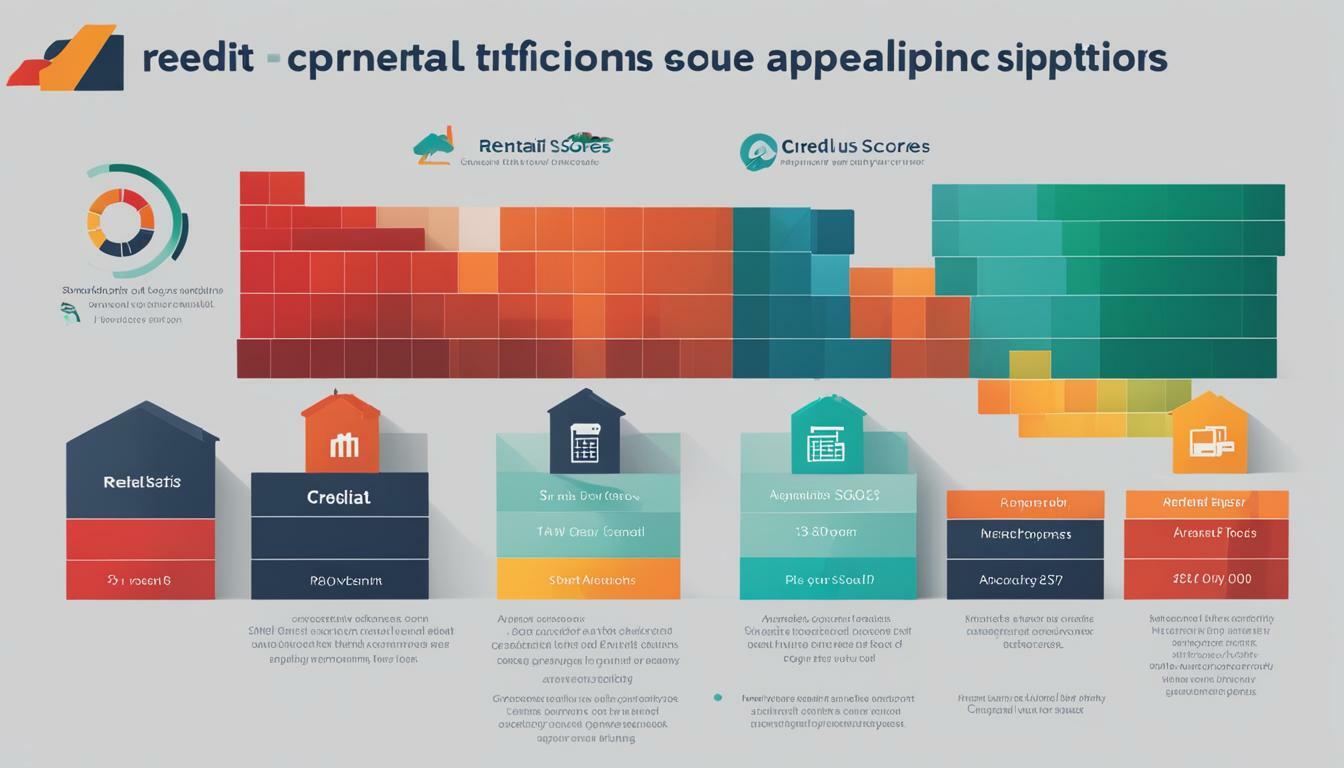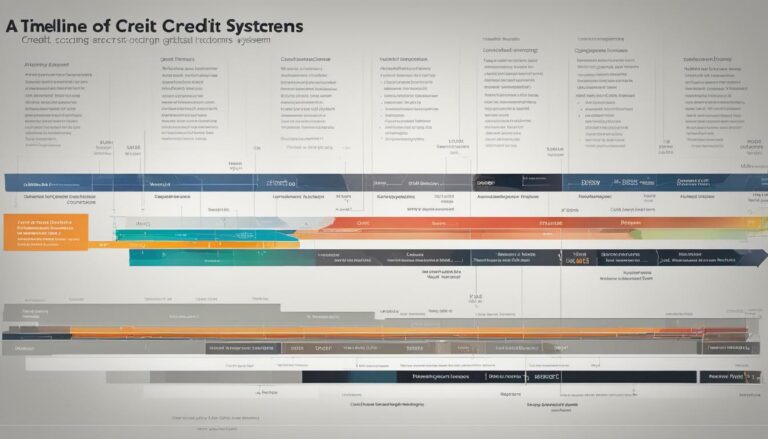Understanding Credit Scores and Rental Applications in the US

When it comes to renting an apartment in the United States, understanding credit scores and rental applications is essential for securing your desired rental property. Landlords often consider credit history when evaluating rental applications, making it crucial to have a good understanding of creditworthiness and how it impacts the approval process.
Key Takeaways:
- Credit scores play a significant role in the rental approval process.
- Having a higher credit score can increase your chances of getting approved, especially in competitive rental markets.
- Factors that affect credit scores include payment history, credit usage, credit history, credit distribution, and recent credit changes.
- Landlords may also consider other factors such as rental history, income, and the presence of a co-signer.
- Improving your credit score, demonstrating a good rental history, and providing proof of income can enhance your chances of securing a rental property.
The Role of Credit History in Rental Applications
Credit history plays a significant role in the rental application process, as landlords frequently conduct tenant screening to assess potential tenants’ creditworthiness. When evaluating rental applications, landlords often consider an applicant’s overall credit history, including their payment history and ability to pay bills on time. This information helps landlords determine the likelihood of an applicant paying rent consistently and on schedule. While there is no specific credit score required to rent an apartment, having a positive credit history can give applicants an advantage.
Factors that landlords may consider when reviewing an applicant’s credit history include their payment history, credit usage, credit distribution, and recent credit changes. Payment history refers to the consistency of on-time payments, while credit usage looks at the amount of available credit being utilized. Credit distribution considers the types of credit accounts an applicant has, such as loans or credit cards, and recent credit changes include any recent inquiries or new accounts opened.
It’s important for applicants to be proactive in maintaining a good credit history. This can be done by paying bills on time, paying off outstanding debts, and disputing any incorrect information on their credit reports. By taking these steps, applicants can improve their credit score and increase their chances of being approved for a rental property. Additionally, having a positive rental history and providing proof of income can also help applicants with lower credit scores demonstrate their ability to be responsible tenants.
🚨 TUIC Errors + Low Credit Score?
CreditScoreIQ helps you build credit faster by reporting utility bills to all 3 bureaus—while you dispute errors.
Start Building Credit Today →Example Table: Factors Affecting Credit Scores
| Factors | Description |
|---|---|
| Payment History | Consistency of on-time payments |
| Credit Usage | Amount of available credit being utilized |
| Credit Distribution | Types of credit accounts |
| Recent Credit Changes | Recent inquiries or new accounts |
Understanding the role of credit history in rental applications is essential for prospective tenants. By maintaining a positive credit history, dispute any incorrect information, and providing additional supporting documentation, applicants can increase their chances of securing a rental property. Although credit scores are not the sole factor in the rental approval process, having a strong credit history can give applicants an advantage and help them stand out from other applicants.
With a good understanding of how credit history affects rental applications and by taking proactive steps to improve their creditworthiness, renters can increase their chances of finding a suitable rental property that meets their needs and preferences. Remember, a positive credit history demonstrates financial responsibility and can greatly impact an applicant’s chances of getting approved for a rental property.
The Impact of Credit Scores on Rental Approval
Your credit score can have a significant impact on your rental approval, as landlords often consider it as a measure of your financial reliability and responsibility. Having a high credit score can increase your chances of getting approved for a rental property, especially in competitive rental markets. While there is no specific credit score required to rent an apartment, a higher score can give you an advantage over other applicants.
When landlords review rental applications, they often look at an applicant’s overall credit history, including their payment history and on-time payments. This allows them to assess your likelihood of paying rent on time. Factors that influence credit scores include payment history, credit usage, credit history, credit distribution, and recent credit changes. It’s important to have a good track record of paying bills on time and to keep credit card balances low to maintain a strong credit score.

In addition to credit scores, landlords may also consider other factors such as rental history, income, and the presence of a co-signer. Demonstrating a positive rental history and providing proof of income can help strengthen your rental application, even if your credit score is not as high as you would like it to be. Additionally, if you have a co-signer with a strong credit history, it can provide reassurance to the landlord about your ability to pay rent on time.
Improving your credit score is possible by paying bills on time, paying off debts, and disputing any incorrect information on your credit reports. Taking proactive steps to enhance your creditworthiness can increase your chances of getting approved for your desired rental property. Remember, every effort you make to improve your credit score can potentially make a difference in the rental approval process.
Factors Affecting Credit Scores
Several factors influence credit scores, including payment history, credit usage, credit distribution, and recent credit changes, all of which can determine your creditworthiness as a renter. Landlords often take these factors into account when evaluating rental applications, as they provide insight into an applicant’s financial responsibility and ability to meet rent obligations.
Payment history: Your payment history is one of the most important factors in determining your credit score. It reflects whether you have paid your bills on time, including credit card payments, loan installments, and monthly rent. A consistent record of on-time payments demonstrates your reliability as a renter and can positively impact your credit score.
Credit usage: Credit usage refers to the amount of credit you are currently utilizing compared to your total available credit. It is recommended to keep your credit utilization ratio below 30% to maintain a healthy credit score. High utilization can suggest financial strain, while low utilization indicates responsible credit management.
Credit distribution: Credit distribution refers to the types of credit you have, such as credit cards, mortgages, and car loans. A diverse credit mix can be beneficial for your credit score, as it shows that you can manage different types of credit responsibly. However, it’s important to only take on credit that you can comfortably handle.
Recent credit changes: Recent credit changes, such as opening new accounts or closing existing ones, can impact your credit score. Rapid, multiple applications for credit can signal financial instability and may negatively affect your score. Conversely, maintaining a long-standing credit history with minimal changes can contribute to a higher credit score.
| Factors Affecting Credit Scores | Impact on Creditworthiness |
|---|---|
| Payment history | Positive payment history demonstrates financial responsibility. |
| Credit usage | Maintaining low credit utilization is favorable. |
| Credit distribution | A diverse credit mix can positively impact credit scores. |
| Recent credit changes | Long-standing credit history with minimal changes is ideal. |
“Your credit score is an essential factor for landlords when evaluating rental applications. It provides insight into your financial responsibility and ability to meet rent obligations. By understanding the factors that influence credit scores, such as payment history, credit usage, credit distribution, and recent credit changes, you can take steps to improve your creditworthiness as a renter. Paying bills on time, maintaining low credit utilization, managing a diverse credit mix, and avoiding frequent credit changes can help you achieve a higher credit score. Remember, a good credit score can give you an advantage in the rental market, even if you have other mitigating factors such as a lower income or a co-signer.”
Improving your credit score requires time and diligence. By focusing on these key factors, you can enhance your creditworthiness and increase your chances of securing your desired rental property.

While credit scores play a significant role, landlords may also consider other factors such as rental history, income, and the possibility of having a co-signer in the rental application process. A positive rental history can demonstrate that you have been a reliable tenant in the past, making landlords more likely to approve your application. Providing proof of income shows that you have a stable source of funds to cover your rent and other expenses. Landlords often require applicants to have a monthly income that is at least three times the monthly rent. However, income requirements may vary depending on the rental market and specific landlord preferences.
If you have a lower credit score, having a co-signer can strengthen your application. A co-signer is an individual who agrees to assume responsibility for the lease if you are unable to fulfill your obligations. This person should have a good credit history and sufficient income to demonstrate their ability to cover the rent if needed. Keep in mind that not all landlords accept co-signers, so it’s important to inquire about their policies before involving a co-signer in your application.
When applying for a rental property, it is essential to provide accurate and complete information to landlords. This includes details about your rental history, income, and any relevant documents that support your application. Be prepared to provide references from previous landlords, proof of employment, and recent pay stubs or bank statements. By carefully preparing these documents and highlighting your strengths as a tenant, you can increase your chances of a successful rental application.
Example: Rental Income Requirement
| Rent | Minimum Monthly Income Requirement (3x rent) |
|---|---|
| $1,000 | $3,000 |
| $1,500 | $4,500 |
| $2,000 | $6,000 |
Providing accurate income information helps landlords assess your ability to afford the rent and ensures that you meet their income requirements. It’s important to review the specific income criteria set by each landlord or property management company to determine if you meet their qualifications.
While credit scores are an important aspect of the rental application process, understanding how rental history, income, and the presence of a co-signer can also influence your chances of approval is crucial. By addressing these considerations and presenting yourself as a responsible and reliable tenant, you can enhance your application and increase your chances of securing your desired rental property.

If you have a lower credit score and are looking to improve it for rental applications, there are several steps you can take, including paying bills on time, disputing any inaccuracies on your credit reports, and actively working towards enhancing your creditworthiness.
Paying bills on time is crucial for maintaining a positive credit history. Late payments can have a negative impact on your credit score, so it’s important to prioritize timely payments. Set up automatic payments or reminders to ensure you never miss a due date and keep your credit on track.
Another important step is to review your credit reports regularly and dispute any incorrect information. Errors on your credit reports can lower your credit score, so it’s essential to address them promptly. Contact the credit reporting agencies to dispute any inaccuracies and provide supporting documentation if necessary.
Improving your credit score also involves actively working towards enhancing your creditworthiness. This includes paying off outstanding debts, keeping credit card balances low, and avoiding opening new credit accounts unnecessarily. By demonstrating responsible credit usage and managing your debts effectively, you can gradually improve your credit score over time.
| Steps to Improve Credit Score for Rental Applications |
|---|
| Pay bills on time |
| Dispute inaccuracies on credit reports |
| Manage debts and credit usage responsibly |
By following these steps and being proactive in improving your credit score, you can increase your chances of securing a rental property. Remember, a higher credit score not only enhances your overall creditworthiness but also gives you an advantage in competitive rental markets.

Even if your credit score is not as high as you would like, having a good rental history and being able to provide proof of income can significantly enhance your chances of securing a rental property. Landlords understand that credit scores are not the sole indicator of a tenant’s reliability, and they often take other factors into consideration. By highlighting your positive rental history and demonstrating financial stability through proof of income, you can showcase your ability to be a responsible tenant.
When applying for a rental property, it’s essential to provide evidence of your rental history. This can be done by obtaining references from previous landlords or property management companies. These references should vouch for your timely rent payments, responsible maintenance of the property, and adherence to the terms of your lease. Including this information in your rental application shows landlords that you have a track record of being a reliable tenant.
Additionally, providing proof of income is crucial in establishing your financial stability. Landlords want to ensure that you have a reliable source of income to cover the monthly rent. You can provide proof of income by including recent pay stubs, tax returns, or bank statements that demonstrate a consistent and sufficient income level. This information assures landlords that you have the financial means to meet your rental obligations.
| Benefits of Demonstrating Good Rental History and Proof of Income | |
|---|---|
| Increased Trust: | Landlords are more likely to trust tenants with a proven track record of meeting their rental obligations. |
| Competitive Advantage: | Having a good rental history and proof of income can give you an edge over other applicants, especially if the rental market is competitive. |
| Stronger Application: | Providing these supporting documents strengthens your rental application and demonstrates your commitment to being a responsible tenant. |
Remember, while credit scores are important, they are not the only factor landlords consider when evaluating rental applications. By showcasing your good rental history and providing proof of income, you can present yourself as a reliable and trustworthy tenant, even if your credit score is not perfect. So, gather your rental references and financial documentation to enhance your chances of securing your desired rental property.

To increase your chances of a successful rental application, it is crucial to navigate the process with preparation and professionalism, ensuring you have all the necessary documents and presenting yourself as a reliable tenant. Landlords consider various factors when reviewing rental applications, including credit history, rental history, and income. By understanding what landlords are looking for and taking appropriate steps, you can stand out as a desirable candidate.
Start by gathering all the required documents to complete the rental application. These may include identification, proof of income, bank statements, and previous rental references. Having these documents ready will demonstrate your reliability and proactive approach, making it easier for landlords to assess your application.
It’s also important to present yourself in a professional manner. Dress appropriately when meeting with the landlord or attending property viewings. Be punctual, respectful, and polite during all interactions. These small gestures can leave a positive impression on landlords, enhancing your chances of a successful application.
Additionally, consider providing additional supporting documents to strengthen your application. This can include a letter of recommendation from a previous landlord, highlighting your responsible behavior as a tenant. You may also include a personal statement explaining any past credit issues or demonstrating your commitment to improving your creditworthiness.

Navigating the rental application process successfully requires careful preparation and professionalism. By ensuring you have all the necessary documents, presenting yourself as a reliable tenant, and providing additional supporting documents, you can increase your chances of a successful rental application. Remember to dress appropriately, be punctual, and maintain a respectful attitude throughout the process. With the right approach, you can stand out from other applicants and secure the rental property you desire.
Conclusion
Understanding the role of credit scores in rental applications is crucial for renters in the US, as it directly impacts their chances of securing their desired rental property. Landlords often consider an applicant’s credit history, including factors like payment history and on-time payments, to assess their creditworthiness and likelihood of paying rent on time.
While there is no specific credit score required to rent an apartment, having a higher credit score can give applicants an advantage, especially in competitive rental markets. A higher credit score indicates a responsible financial history and demonstrates the ability to manage debts effectively.
In addition to credit scores, landlords may also consider other factors such as rental history, income, and the presence of a co-signer. Maintaining a good rental history, providing proof of income, and having a responsible co-signer can help applicants with lower credit scores increase their chances of getting approved for a rental property.
To improve credit scores for rental applications, it’s important for applicants to pay bills on time, pay off existing debts, and regularly review their credit reports for any inaccurate information. Taking proactive steps to enhance one’s creditworthiness, such as disputing incorrect information and reducing credit card balances, can significantly improve credit scores over time.
In conclusion, understanding credit scores and their impact on rental applications is essential for renters in the US. By taking steps to improve credit scores, demonstrating a good rental history, and providing proof of income, applicants can maximize their chances of securing their desired rental property and establish themselves as reliable and responsible tenants.
FAQ
What role does credit history play in rental applications?
Credit history often plays a significant role in rental applications. Landlords frequently consider an applicant’s credit history to assess their likelihood of paying rent on time.
Does having a higher credit score improve rental approval chances?
Having a higher credit score can increase your chances of getting approved for a rental property, especially in competitive rental markets.
What factors affect credit scores?
Several factors can influence credit scores, including payment history, credit usage, credit history, credit distribution, and recent credit changes.
Are there factors other than credit scores that landlords consider in rental applications?
Yes, landlords may also take into account factors such as rental history, income, and the presence of a co-signer when evaluating rental applications.
How can I improve my credit score for rental applications?
To improve your credit score, it’s important to pay bills on time, pay off debts, and dispute any incorrect information on your credit reports.
Does having a good rental history and proof of income help applicants with lower credit scores?
Yes, having a good rental history and providing proof of income can positively impact rental applications, even for individuals with lower credit scores.
What can I do to navigate the rental application process successfully?
To navigate the rental application process successfully, it’s important to gather necessary documents, prepare for the application, and present yourself as a reliable and responsible tenant.
Why is it important to understand credit scores and rental applications?
Understanding credit scores and rental applications is crucial for renters in the US as it can directly impact the approval process for rental properties.
Ready to Improve Your Credit?
Disputing TUIC errors is step one. Step two? Boost your score by reporting utility payments with CreditScoreIQ.
Get Started Now (Only $1 Trial) →3-bureau reporting • $1M identity insurance • Dark web monitoring






